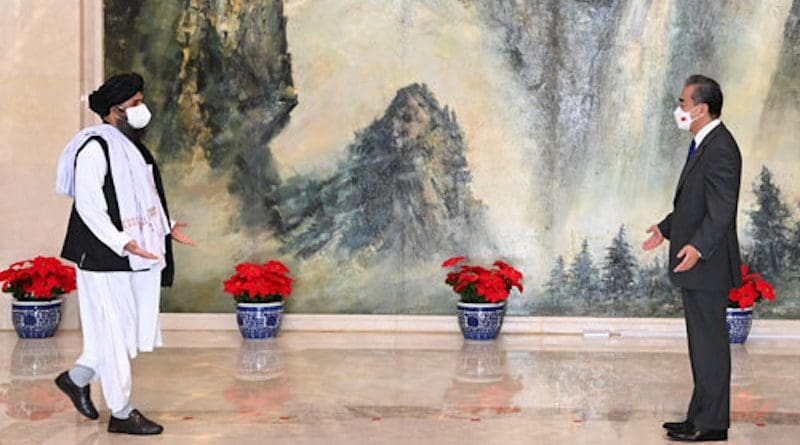Taliban Takeover Is Bad News For China – Analysis
By Michael Clarke*
The withdrawal of the United States from Afghanistan has prompted much breathless commentary, including on the implications for China’s role in the region. But despite predictions of sweeping geopolitical gains, China will be observing the Taliban takeover with significant concern.
One narrative suggests that US withdrawal from Afghanistan will enable China to swoop in and scoop up the country’s mineral resources or broker a partnership with the Taliban to make Afghanistan a vital part of its Belt and Road Initiative. Supposedly, it may even prompt Beijing to ‘prosecute its interests with regard to Taiwan’ in the near term.
Such commentary is hyperbolic. It ignores both the record of China’s relationship with the Taliban when they controlled most of Afghanistan in the 1990s and the hierarchy of Beijing’s interests in Central Asia. China’s defensive interests — such as ensuring no spill-over of security threats from Afghanistan into Xinjiang — remain pre-eminent. Its more positive interests, from economic investment through to pushing for a greater role for the Shanghai Cooperation Organization (SCO), come a distant second.
Many analysts ignore these factors in favour of the distorting lens of US–China strategic competition. Executive Director of the Australian Strategic Policy Institute Peter Jennings, for instance, claims that the ‘attitude of Beijing … to what’s happened in Afghanistan will probably be one of absolute delight’ and that such a set-back for US credibility will have repercussions throughout the Indo-Pacific.
It is true that Chinese officials and media are expressing schadenfreude over the US ‘defeat’ in Afghanistan. In a phone call with US Secretary of State Antony Blinken, Foreign Minister Wang Yi made a thinly veiled jab at the US record of regime change interventions — noting that events in Afghanistan ‘proved once again that a regime cannot stand without the support of the people’. The reliably jingoistic Global Times asserted that Washington’s Afghanistan failure contrasts US ‘arrogance to transform other countries’ with ‘China’s values of world order and governance’.
This rhetorical point-scoring is also coupled with caution and even apprehension about China becoming overly involved in the country. China’s defensive interests remain at the forefront of its Afghanistan calculations.
Qian Feng of Tsinghua University notes the full mix of opportunities and risks that confront China — from perceived threats to Xinjiang to the potential to ‘participate in Afghanistan’s reconstruction’ and great power ‘games’. His assesment bears the stamp of Beijing’s long-standing hierarchy of interests. With respect to the threat to Xinjiang, Qian argues — in terms almost identical to those espoused by China in the 1990s — that ‘the turmoil in Afghanistan spills northward to Central Asian countries, and southward to Pakistan and other countries, and then to China’. Regardless of who governs Afghanistan, China’s core interest there is to ensure that Kabul continues the fight against terrorism.
As for an emerging great power ‘game’ for influence in the country, Qian notes that Washington’s influence in Afghanistan will decline significantly, leaving China, India, Pakistan, Russia and the Central Asian states as important stakeholders.
In the recent past, China attempted to use the SCO to mediate the divergent interests that this group of states has in Afghanistan. But Beijing lost its patience with the unwieldy SCO and is now doing more with minilaterals such as its Quadrilateral Cooperation and Coordination Mechanism with Tajikistan, Pakistan and Afghanistan, and the China+C5 group (China and the Central Asian republics). These efforts remain heavily focused on securing Xinjiang from any ‘terrorist’ contagion from Afghanistan.
Smaller conclaves like China+C5 allow Beijing to set the agenda without compromising with regional players such as Russia and India. They also clearly reveal the hierarchy of China’s interests. The joint statement of the May 2021 China+C5 meeting, for example, announced a number of new economic and infrastructure initiatives but also underscored Chinese caution about Afghanistan, speaking in vague terms about the grouping’s desire for a ‘political settlement’ to the conflict. Elsewhere, Wang has spoken about assisting Afghanistan to achieve a ‘soft landing’.
In short, Beijing remains concerned that Afghanistan doesn’t once again become a source of regional instability as it did in the 1990s.
China’s ideal outcome would be to see the Taliban having to compromise with other political forces in the country instead of achieving outright victory. That for now appears a forlorn hope. This will likely see Beijing continue its bilateral and minilateral endeavours with Central Asian states to mitigate any spill-over of instability. Recent attacks on Chinese citizens and assets in Pakistan underscore for Beijing that it can ill-afford to see Afghanistan become a safe-haven for militant groups that may wish to target it.
In the immediate term, China has very clear reasons to privilege its defensive interests as it charts a path to deal with a post-US and Taliban-dominated Afghanistan.
*About the author: Michael Clarke is a Visiting Fellow at the Australia-China Relations Institute, University of Technology Sydney and a Visiting Fellow in the Strategic and Defence Studies Centre at the Australian National University.
Source: This article was published by East Asia Forum


There is no threat to China. There no significant number of Uyghur in Afghanistan. Taliban, Pakistan and China are naturally good friends. They share the same belief and system.